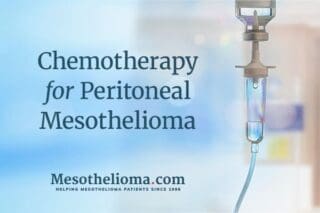
Cryotherapy is an emerging cancer treatment. However, cryotherapy for the treatment of malignant mesothelioma is still under investigation. The therapy is currently studied across the world and is available to patients through clinical trials. The research focused on cryotherapy for mesothelioma is limited. But according to recent results, researchers have found success using the therapy to treat pleural and peritoneal mesothelioma. Cryotherapy may also be used palliatively for symptom management.
What Is Cryotherapy?
Cryotherapy is the use of extremely cold fluid or gas to destroy tissue by freezing it. Once the tissue is below freezing, blood flow is disrupted and the cells burst. Any remaining cells can swell and burst during the tissue thawing process.
Cryotherapy may be used alone or as part of a multimodal treatment plan. For instance, the therapy may be administered before surgery or after surgery. Some patients may also undergo the therapy to provide symptom relief (palliative care).
How Does Cryotherapy Work?
- A cryogen (liquid nitrogen or argon gas) circulates through a hollow device called a cryoprobe.
- A physician uses imaging guidance (MRI or ultrasound) to place the cryoprobe in contact with a tumor.
- The physician monitors the freezing of the target tissue to minimize damage to nearby healthy tissue.
- When the cryoprobe lowers the temperature of the target tissue below freezing, the blood flow is interrupted and cells burst.
- As the tissue thaws, any remaining intact cancer cells may swell and burst.
- Physicians repeat the freezing and thawing cycles as many times as necessary to kill the target tumor.
- Frozen tumor tissue can be removed surgically, or the body may naturally absorb it.
Benefits and Drawbacks of Mesothelioma Cryotherapy
Like any treatment type, cryotherapy may not be the best option for all mesothelioma patients. Before making any treatment decisions, patients should discuss the benefits and risks of cryotherapy with their doctors. For some, the benefits may outweigh the risks.
What Are the Benefits of Mesothelioma Cryotherapy?
There are many benefits to cryotherapy for the treatment of mesothelioma, including its low cost and less invasive nature. Cryotherapy is less invasive than typical surgical treatment for mesothelioma. Because cryotherapy doesn’t include major incisions it:
- doesn’t require general anesthesia
- has a shorter recovery time
- has less frequent and severe side effects
- is less expensive to undergo
- may be an option for high-risk patients
The limited side effects and shorter recovery time are a result of the targeted approach of cryotherapy. The ability to target the treatment reduces damage to surrounding healthy tissue. This allows for the safe repetition of cryosurgery. The limited side effects also enable using cryotherapy in combination with other treatments.
Additionally, the limited risk associated with cryotherapy makes it a viable option for a variety of patients. Cryotherapy may be especially beneficial for high-risk patients. For example, those with inoperable mesothelioma may benefit from the therapy’s targeted nature. These patients may be older or have underlying medical conditions that make them ineligible for surgery. Cryotherapy may be a safer treatment option for this patient population.
What Are the Drawbacks of Mesothelioma Cryotherapy?
Drawbacks of mesothelioma cryotherapy include limited data and treatment limitations. These drawbacks are largely because cryotherapy is a relatively new treatment.
- Lack of data: Lack of clarity about how long treatment results will last
- Treatment limitations: Physicians can only treat tumors that are visible on imaging scans
Patients may also face obstacles related to the cost of treatment. Cryotherapy may not be covered by insurance because of its newness. Costs associated with cancer are often a major hurdle for families, so they may decide not to pursue this or other emerging mesothelioma treatments. However, there are various forms of financial assistance available for patients.
Success Treating Mesothelioma With Cryotherapy
Cryotherapy for mesothelioma is still in the early stages, but researchers have found success in small trials.
A study published in 2017 reported no recurrence 30 days after cryotherapy treatment. Researchers noted larger freezing margins around the tumors contributed to the lack of recurrence. Physicians in the study treated 24 malignant pleural mesothelioma patients from 2008 – 2012. All patients experienced recurrence after prior treatment.
- 21 patients previously underwent pleurectomy/decortication
- 3 patients had undergone thoracoscopic partial debulking and pleurodesis
- 11 patients received chemotherapy
- 15 patients received radiation therapy
To be eligible for the study, patients could have no more than six tumors. Once accepted into the study, patients were eligible for repeat cryotherapy as long as total tumors at one time did not exceed six.
Following cryotherapy treatment:
- At a 30-day follow-up, researchers observed recurrence-free survival in 100% of patients.
- More than 70% of patients were recurrence-free after three years.
Researchers acknowledge the small participant size limits the data. However, the data suggests cryotherapy can be an effective treatment for patients with up to six tumors.
Other researchers have studied cryotherapy as a supplementary cancer treatment option. One study tested cryotherapy as part of a multimodal treatment plan for patients with unresectable tumors. Survival improved when treating patients with cryotherapy combined with photodynamic therapy and intracavitary chemotherapy.
The study included peritoneal and pleural mesothelioma patients. Some patients were treated comprehensively, while others underwent cryotherapy for symptom management.
The researchers report a median overall survival of 41 months. This figure includes results from all 27 patients in the study: those treated comprehensively and those who underwent palliative treatment.
Similar to the other study, data is limited with a small patient group. However, these preliminary positive results may pave the way for larger studies in the future. Studies with more participants can further test the treatment efficacy for mesothelioma patients.
What Types of Cancer Are Currently Treated With Cryosurgery?
Although treating mesothelioma with cryotherapy is still in trials, many other cancers are successfully treated with the therapy. In addition to cancer treatment, cryosurgery is also used for some non-cancerous and precancerous conditions.
Where Can Mesothelioma Patients Receive Cryosurgery?
According to the National Cancer Institute (NCI), cryosurgery is offered at a limited number of cancer centers and hospitals in the United States. Patients should discuss with their doctors if there are any mesothelioma cancer centers in their area offering this specialized therapy.
Participating in a cryotherapy clinical trial may be an option for those not near a location offering the treatment. Eligibility criteria for clinical trials vary and all patients may not meet the requirements.




